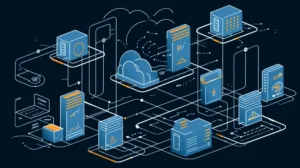Cloud Computing
Cloud computing is the delivery of computing services via the Internet. Instead of storing and processing data on local servers or personal computers, cloud computing allows individuals and businesses to access computing resources and services remotely via a network of servers housed in data centres.
Cloud Computing as a course
Here are some key topics that may be covered in a cloud computing course:
- Introduction to Cloud Computing consists of concepts, Benefits, and Service Models (IaaS, PaaS, SaaS).
- Cloud infrastructure includes virtualization, networking, storage, and high availability.
- Cloud Service Providers include an overview and comparison of major providers (AWS, Azure, GCP).
- Cloud security, challenges, best practices, identity management, and encryption.
- Containers, serverless computing, DevOps, and CI/CD are all examples of cloud application development.
- Databases, big data, data warehousing, and migration are all aspects of cloud data management.
- Cloud Cost Optimization deals with pricing strategies, resource monitoring, and cost-cutting techniques.
- Cloud governance and management include frameworks, SLAs, migration strategies, and performance management.
- Hands-on experience with cloud platforms, VMs, storage, and application deployment.
Cloud Computing Course Degrees
1. Bachelor’s Degree in Cloud Computing
- A specialized program focusing on cloud computing.
- Infrastructure, security, application development, and management are all addressed.
- Provides a thorough understanding of cloud technologies.
2. Bachelor’s Degree in Computer Science/Information Technology with a focus on Cloud Computing Concentration:
- A computer science or IT program with a focus on cloud computing.
- Provides a broader foundation in computer science or IT.
- Includes specific cloud-related courses.
3. Master’s Degree in Cloud Computing
- Advanced cloud computing program.
- Examines advanced cloud concepts, architecture, security, and management.
- Research or project components may be included.
4. Master’s Degree in Computer Science/Information Technology with a Cloud Computing Specialisation
- Provides advanced coursework as well as research opportunities.
- Gives a thorough understanding of cloud technologies within the context of computer science or information technology.
5. Graduate Diploma in Cloud Computing
- Shorter-term program for professionals seeking specialized knowledge.
- The course focuses on cloud computing concepts, technologies, and applications.
- Individuals with a prior bachelor’s or master’s degree should apply.
Jobs in Cloud Computing
Cloud engineers implement and manage cloud solutions, such as virtual machine setup, network configuration, and cloud-based application and service maintenance.
Cloud Developers are responsible for designing and developing applications that run on cloud platforms. They use cloud services and APIs to build scalable, resilient applications.
DevOps engineers are responsible for the integration of development and IT operations and the automation of the deployment and management of cloud-based applications and services.
Security Specialists are responsible for ensuring the security and compliance of cloud environments, implementing security measures and monitoring for potential threats.
Data Engineers create and maintain data pipelines and data warehouses in the cloud, allowing for efficient data processing and analysis.
Cloud consultants help organizations adopt cloud technologies by providing expert advice and guidance on cloud migration, architecture design, and optimization.
Administrators manage and monitor cloud infrastructure to ensure it operates smoothly, efficiently, and securely.
Operations Managers are in charge of the day-to-day operations of cloud-based services and applications, ensuring high availability and performance.
Sales Specialists work with businesses and clients to sell cloud-based products and services.
Is Cloud Computing as a course worth it?
Choosing a cloud computing course is a wise decision for several reasons. The growing demand for cloud professionals means plenty of job opportunities will exist.
Cloud computing is highly relevant in today’s industry, providing organizations scalability, flexibility, and cost savings. Acquiring cloud skills allows you to advance your career, gain access to higher-level positions, and contribute to organizational innovation and efficiency.
Furthermore, continuous learning in this dynamic field keeps you updated on the latest technologies, making you a valuable asset in the ever-changing tech landscape. Overall, investing in a cloud computing course can pave the way for a bright future filled with professional growth and success.



